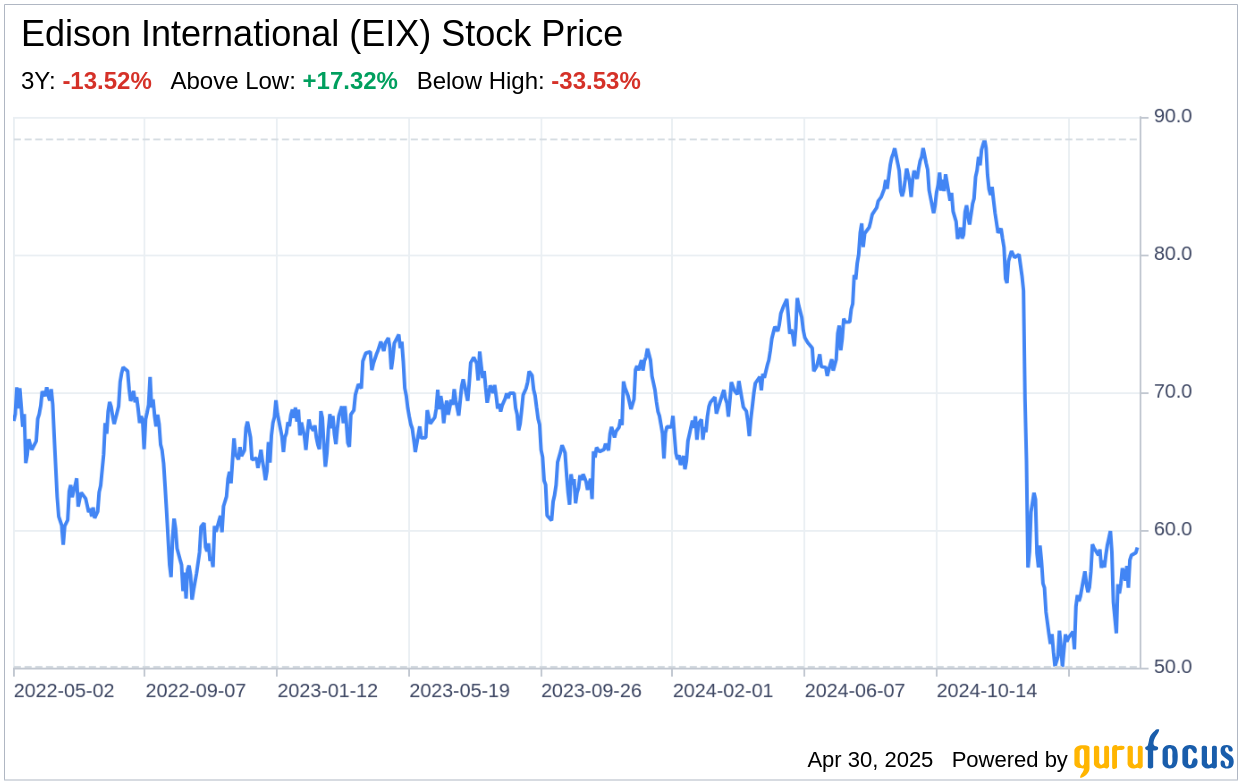Edison International (EIX, Financial), the parent company of Southern California Edison, has released its 10-Q filing on April 29, 2025, providing a detailed account of its financial and operational performance. The company has demonstrated a remarkable turnaround, with net income attributable to common shareholders soaring to $1,436 million from a loss of $11 million in the previous year. This SWOT analysis delves into the strengths, weaknesses, opportunities, and threats as revealed by the latest financial data and strategic disclosures, offering investors a comprehensive view of Edison International's market position and future prospects.

Strengths
Financial Resilience and Operational Efficiency: Edison International (EIX, Financial) has exhibited financial resilience, with a significant increase in operating income from $245 million to $2,134 million year-over-year. The company's operational efficiency is evident in the reduction of operation and maintenance expenses from $1,317 million to $983 million, showcasing effective cost management. This financial strength provides Edison International with a solid foundation to invest in growth initiatives and navigate economic fluctuations.
Regulatory Recovery Mechanisms: The company's ability to recover wildfire-related claims, as indicated by the net recoveries of $1,305 million, reflects a strong regulatory framework that supports financial stability. Edison International's strategic engagement with regulatory bodies ensures that it can mitigate financial impacts from environmental risks, which is crucial for maintaining investor confidence and long-term viability.
Investment in Sustainable Energy Solutions: Edison International's subsidiary, Edison Energy, operates as a global energy advisory firm, offering integrated sustainability and energy solutions. Although not a significant segment yet, this focus on sustainability positions the company at the forefront of the energy transition, aligning with global trends and customer demand for clean energy and advisory services.
Weaknesses
Dependence on Regulatory Approvals: The company's performance is closely tied to regulatory decisions, as seen in the reliance on the 2024 authorized revenue requirement for recognizing revenue. This dependence on regulatory outcomes introduces uncertainty and may impact the company's ability to execute its strategic plans, including capital investment programs and wildfire mitigation efforts.
Environmental Risk Exposure: Edison International's operations are inherently exposed to environmental risks, such as wildfires and extreme weather events. Despite successful recoveries in the past, the ongoing threat of such incidents poses a significant challenge to the company's operational and financial stability, necessitating continuous investment in mitigation and adaptation strategies.
Competitive Pressures: The emergence of Community Choice Aggregators (CCAs) and Electric Service Providers (ESPs) presents competitive pressures that could lead to customer bypass or departure, potentially resulting in higher rates for remaining utility bundled service customers. This competitive landscape requires Edison International to innovate and enhance its value proposition to retain and grow its customer base.
Opportunities
Grid Modernization and Electrification: Edison International (EIX, Financial) has the opportunity to lead in grid modernization to support the growing demand for electrification. Investments in infrastructure upgrades and the implementation of strategic plans, such as the Wildfire Mitigation Plan (WMP), can enhance system reliability and cater to the electrification needs of Southern California, driving growth and customer satisfaction.
Energy Transition and Policy Support: The Inflation Reduction Act of 2022 and other policy initiatives offer significant opportunities for Edison International to capitalize on investment tax credits and other incentives. These policies support the company's efforts in GHG reduction and the deployment of energy storage projects, positioning it to benefit from the transition to a low-carbon economy.
Technological Innovation: Advancements in technology provide Edison International with opportunities to improve operational efficiency and offer new energy-related products and services. By leveraging innovations in energy storage, distributed generation, and smart grid technologies, the company can enhance its competitive edge and meet the evolving needs of its customers.
Threats
Regulatory and Legislative Changes: Changes in regulatory or legislative environments, particularly those that may limit operational measures for wildfire risk mitigation or affect the importance placed on GHG reduction, could adversely impact Edison International's operations and strategic goals. The company must navigate these uncertainties and adapt to ensure compliance and maintain its social license to operate.
Financial Market Conditions: Edison International's access to capital and financing costs are influenced by credit ratings, which may be affected by factors such as the implementation of AB 1054 and the frequency and severity of wildfires. Downgrades in credit ratings could increase borrowing costs and impact the company's ability to fund its capital requirements and strategic initiatives.
Climate Change and Natural Disasters: The increasing frequency and intensity of climate change-related events, such as wildfires and extreme weather, pose ongoing threats to Edison International's infrastructure and operations. Proactive measures and investments in resilience are essential to mitigate these risks and ensure the continuity of service to customers.
In conclusion, Edison International (EIX, Financial) has demonstrated strong financial performance and operational efficiency, underpinned by a robust regulatory recovery mechanism and a strategic focus on sustainable energy solutions. However, the company faces challenges related to regulatory dependence, environmental risks, and competitive pressures. Opportunities for growth lie in grid modernization, policy-driven energy transition, and technological innovation. Edison International must remain vigilant against threats from regulatory changes, financial market conditions, and climate change impacts. By leveraging its strengths and addressing its weaknesses, the company is well-positioned to capitalize on opportunities and navigate threats in the evolving energy landscape.
This article, generated by GuruFocus, is designed to provide general insights and is not tailored financial advice. Our commentary is rooted in historical data and analyst projections, utilizing an impartial methodology, and is not intended to serve as specific investment guidance. It does not formulate a recommendation to purchase or divest any stock and does not consider individual investment objectives or financial circumstances. Our objective is to deliver long-term, fundamental data-driven analysis. Be aware that our analysis might not incorporate the most recent, price-sensitive company announcements or qualitative information. GuruFocus holds no position in the stocks mentioned herein.
